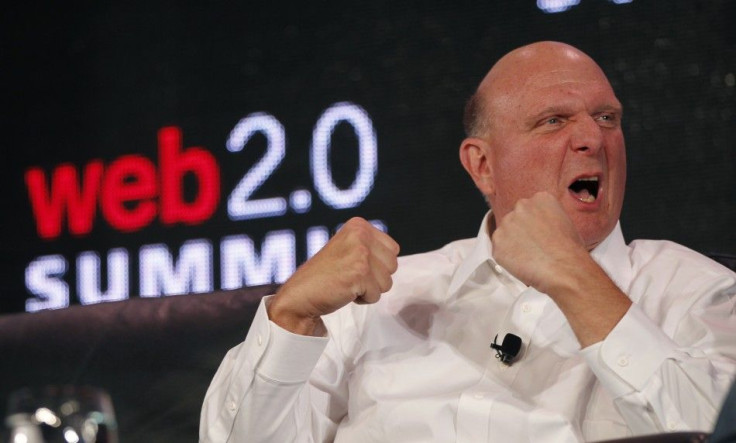Microsoft CEO Steve Ballmer Slings Mud at Apple, Google During Web 2.0 Summit [VIDEO]

Microsoft CEO Steve Ballmer lambasted the company's two most prominent rivals, Google and Apple, in a discussion at the annual Web 2.0 Summit, which hosts several conversations centered around information sharing, digital collaboration and social media.
The cheap shots were thrown when conference chairman John Battelle began asking questions about the Microsoft search engine Bing. Battelle began the conversation by reminding Ballmer that he'd once grew quite animated when he was initially pitching Microsoft search engine Bing.
Ballmer shook off the question by saying the search engine is continuing to grow. He said that Bing has grown from a about 7% share to almost 15% share of the market. Still, it's a small share, Ballmer admits, but it's a nice rise. He went on to say that Microsoft went from the number three most popular search engine to the number two most popular search engine, mostly through the alliance with Yahoo.
Ballmer then issued a challenge the the crowd: He asks people to test any search they want on Google and Bing. Regarding the results, he says 70% of the time you won't care, 15% of the time you'll probably like [Bing] better, and 15% of the time you'll like [Google] better. He added that Microsoft Bing has a better user interface than the other search engines and that the company strived to make the search engine much more than just blue links.
The conversation quickly shifted to social media, which is largely what Web 2.0 Summit is centered around. Battelle asks Ballmer if Microsoft is going to punt on social given the recent failed attempts at social such as Google Buzz and other projects taken on by the search giant. Ballmer responded by refering to the 50 million users on Xbox Live. He also adds that Microsoft's aquisition of Skype helps them compete in the social markets, albeit in a much more direct way.
We're adding connectivity to people into our core products—Bing, office, etc.—sometimes in partnerships, sometimes on our own, and the aquisition of Skype is a big step down a path that's all about connecting you with other people, Ballmer said.
Then, Battelle asked Ballmer another very direct, provocative question: Are you glad you didn't buy Yahoo for $44 billion?
Times change. Times change, said Ballmer. You ask any CEO who might have bought something before the market crashed, in 2008, and you ask, 'are you glad that you didn't buy something...' then he threw up his hands and looked at the ceiling as if to say, 'thank goodness'.
Sometimes you're lucky in this life, Ballmer said in a snarky tone.
The discussion later shifted from Yahoo to cloud computing, the popular buzz word of the moment that's used to describe online data access and storage service. Many of largest technology companies in the world have invested large sums in the industry including Microsoft.
All in, baby, Ballmer said in regards to cloud computing with a smile. Ballmer simplifies cloud computing to two terms: productivity and communication. He claims that Microsoft is beating Google in the cloud, specifically with apps offered in the cloud. Specifically, this refers to items such as their Office 365 suite.
Ballmer admits that Microsoft can be doing better in what he describes as the platform part of the industry, meaning devices and servers that the cloud runs from. He mentions Amazon and VMware by name, indicating that he believes they're the top competitors in cloud infrastructure.
Later in the discussion, Microsoft Kinect becomes a topic of discussion and Ballmer touts the deals Microsoft has signed with several companies including National Geographic and Sesame Street. He alludes to several new experiences being introduced to the Kinect around the holiday season. Both Ballmer and Batelle see room for Microsoft Kinect to grow.
In what appeared to be a softball question, Battelle asked Ballmer to tell him why he should buy something from Microsoft and not Apple, namely a Windows 7 phone versus an iPhone. Ballmer resorts to referencing the availability of apps on the iPhone as a sea of icons and touts how Windows 7 puts information front and center.
There's certainly some nice things Apple has doen with Siri, but they're some of the same things we've been doing for a year. We're on our next generation... he said.
You don't need to be a computer scientist to use a Windows phone, says Ballmer. I think you do to use an Android phone. [They're] pretty inconsistent. [They] don't look alike. He later adds, It's very hard to be excited, for me, about Android phones. Apples a good competitor--a different kind of competitor.
© Copyright IBTimes 2025. All rights reserved.





















